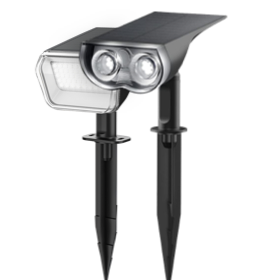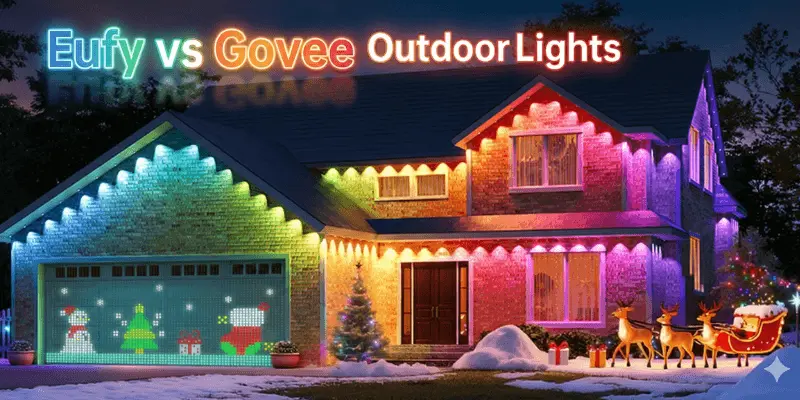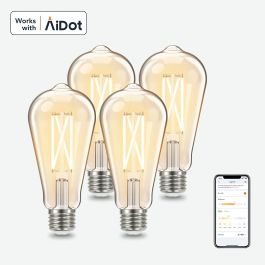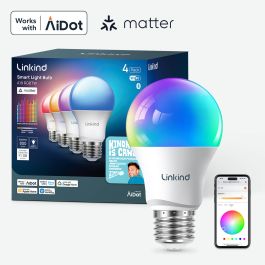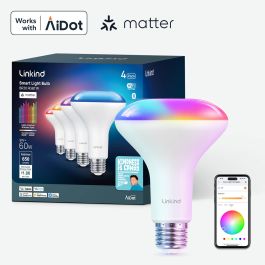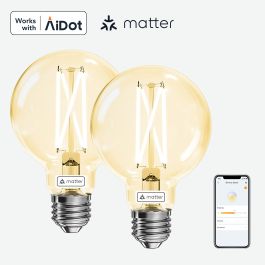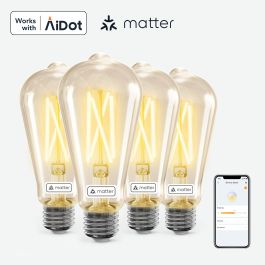Bluetooth vs. WiFi Light Bulbs: Which is Best for Your Smart Home?
Bluetooth vs. WiFi Light Bulbs: Which is Best for Your Smart Home?
Have you ever wondered how smart home technology can revolutionize your everyday living? The rise of smart light bulbs is a testament to this innovation. This article delves into the world of smart light bulbs, comparing Bluetooth and WiFi options to help you decide which is best for your smart home. Our goal is to highlight their differences and advantages, ultimately guiding you to make an informed decision.
Understanding Smart Light Bulbs
Smart light bulbs have evolved beyond merely illuminating a room; they now enhance your lifestyle with unparalleled convenience, energy efficiency, and sophisticated control. Imagine adjusting the brightness or color of your lights from your couch, or scheduling them to turn on or off via your smartphone or voice commands. This is the future of smart lighting technology.
Benefits of Smart Lighting Bulbs
1. Energy Efficiency: Smart bulbs typically utilize LED technology, which is far more energy-efficient than traditional incandescent bulbs. This not only helps reduce your carbon footprint but also cuts down on electricity bills. The ability to dim the lights and schedule their operation means you can further optimize energy consumption.For a detailed comparison, can see Incandescent Light Bulb vs LED.
2. Convenience: With smart light bulbs, the days of manually flipping a switch are over. You can adjust your lighting with a simple tap on your smartphone or a voice command. This level of convenience is particularly beneficial in a multi-tasking household, where efficiency is key.
3. Enhanced Control: Smart bulbs offer customization options that traditional bulbs simply can't match. You can create tailored lighting scenes for various activities and moods. Whether you’re winding down with a book, enjoying a movie, or entertaining guests, you can set the perfect ambiance effortlessly.
Smart Home Integration
Incorporating smart light bulbs into your home isn’t just about convenience; it's about creating an interconnected ecosystem. These bulbs can seamlessly integrate with smart home hubs like Amazon Alexa, Google Home, or Apple HomeKit. This means your lighting can interact with other smart devices in your home. For example, your lights can automatically turn on when your smart doorbell detects motion or change color to alert you to different events. This level of integration not only enhances your home’s functionality but also increases its security and energy efficiency.
By adopting smart light bulbs, you are stepping into a world where your home responds intuitively to your needs, creating a living environment that is as efficient as it is enjoyable. Smart lighting technology transforms everyday living, making your home smarter and your life simpler.
Bluetooth Light Bulbs vs. WiFi Light Bulbs
When choosing the best smart light bulbs for your home, Bluetooth and WiFi are two of the most popular options. Let's break down their features, advantages, and differences to help you make an informed decision.
Bluetooth Light Bulbs: Bluetooth light bulbs are a straightforward and user-friendly option. They connect directly to your smartphone or other Bluetooth-enabled devices without needing a central hub or internet connection. This simplicity makes them incredibly easy to set up and use. However, they do have a limited range, typically around 30 feet, which might be a constraint in larger homes. Bluetooth bulbs are ideal for small apartments or single-room setups where you need quick and reliable control over your lighting.

WiFi Light Bulbs: WiFi light bulbs connect to your home’s WiFi network, offering a broader control range. This means you can manage your lights from anywhere with an internet connection, making them perfect for those who want remote access and advanced smart home integration. WiFi bulbs can interact seamlessly with other smart home devices, providing a comprehensive smart home experience. However, they do tend to consume more power and require a stable internet connection to function optimally.

Key Comparison Table
|
Feature |
Bluetooth Light Bulbs |
WiFi Light Bulbs |
|
Advantages |
Easy setup, no need for internet, lower power consumption |
Control from anywhere, integrates well with other smart devices |
|
Disadvantages |
Limited range, fewer features |
Depends on internet, higher power consumption |
|
Range Limitations |
Typically up to 30 feet |
As far as your WiFi signal reaches |
|
Use Cases |
Small apartments, single rooms |
Whole-home integration, remote access |
|
How They Work |
Connects via Bluetooth to your phone |
Connects to your home WiFi network |
|
Cost |
Generally lower |
Generally higher |
Choosing the Right Smart Light Bulbs for Your Needs
Selecting the perfect smart light bulbs for your home involves considering a few key factors:
1. Home Size: The size of your home plays a crucial role in determining the type of smart bulb you need. For larger homes, WiFi light bulbs are typically more suitable due to their extended range and connectivity. They allow you to control your lighting from any room, or even when you're away from home, providing seamless and comprehensive coverage.
2. Existing Smart Home Setup: If you already have a smart home hub or other smart devices, WiFi bulbs might integrate more seamlessly into your existing ecosystem. They can communicate with your other devices to create a truly interconnected home, offering advanced automation and synchronized control over multiple gadgets.
3. Budget: Budget is always an important consideration. Bluetooth bulbs are generally more affordable upfront, making them a cost-effective option for those looking to dip their toes into smart lighting. However, WiFi bulbs, with their additional features and broader control capabilities, might justify the higher investment for those seeking a more robust smart home experience.
4. Desired Features: Think about what you want from your smart bulbs. If remote access, extensive automation, and integration with other smart devices are high on your priority list, WiFi bulbs are the way to go. They offer the ability to control your lights from anywhere, set up complex schedules, and even interact with other smart home devices for a cohesive experience. On the other hand, if you prefer simple, local control without the need for an internet connection, Bluetooth bulbs will suffice, offering reliable performance and ease of use.
To dive deeper into choosing the right smart light bulbs for your needs, check out: Finding the Right Smart Light Bulb for Your Smart Home. This article will provide you with comprehensive insights and help you make an informed decision tailored to your specific requirements.
The Linkind Wi-Fi Smart LED Bulb, a cutting-edge lighting solution designed to elevate your home experience. Enjoy customizable lighting with a dimming range from 3% to 100% and adjustable color temperature from warm to cool white (2700K to 6500K). With compatibility with Alexa, Google Home, and the AiDot app, controlling your lights has never been easier. Say goodbye to the hassle of 2.4G WiFi connections, as this bulb offers seamless control via voice commands, the app, or a pre-paired remote control. No hub required, making setup a breeze, and with advanced features like time scheduling and group control, you can personalize your lighting experience effortlessly. Plus, save on energy costs with the Linkind Wi-Fi Smart LED Bulb's energy-efficient design, delivering over 85% cost savings compared to traditional halogen bulbs while providing 800lm of bright, tunable white light.
Tunable and Dimmable White Light: Enjoy a dimming range of 3% to 100% and easy color temperature adjustment (2700K to 6500K) from warm to cool white with our WiFi light bulbs that are not compatible with any dimmers. Multiple control methods: offers a trifecta of convenient control options - via the AiDot app, voice commands with Alexa and Google Home, or a pre-paired remote control - eliminating the need for a 2.4G WiFi connection and making your lighting experience hassle-free. No Hub Required: Enjoy the ultimate convenience with the Edison smart bulbs, allowing you to effortlessly control your lighting without a hub using either the AiDot app or the user-friendly one-button remote control, complete with a magnetic piece for easy attachment to your refrigerator. Time Schedule Function: Unlock the full potential of your Edison smart bulbs by connecting them to the AiDot app and enjoy a plethora of advanced features such as time scheduling, preset options, and group control, taking your lighting experience to the next level. Energy Efficient: Experience the perfect combination of brightness and energy-efficiency with the Edison smart E26 LED bulbs, featuring an 800lm tunable white light that's ideal for everyday use while delivering significant cost savings of over 85% on your electricity bill compared to 60W halogen bulbs.
The Linkind Wi-Fi Smart Light Bulb A19 RGBTW, a versatile addition to your smart home setup. With seamless compatibility with popular voice assistants like Alexa and Google Assistant, as well as the intuitive AiDot app, controlling your lighting has never been easier. Whether you prefer effortless voice commands or adjusting settings from anywhere using your smartphone, this bulb offers convenience at your fingertips, thanks to its stable 2.4GHz Wi-Fi connection. Create the perfect ambiance for any occasion with 16 million colors and a color temperature range from 2700K to 6500K. Schedule automatic on/off times and select preset scenes to effortlessly decorate your home. With its RGBTW color options and universal design, this light bulb caters to a wide range of everyday scenarios, making it an essential addition to any modern household.
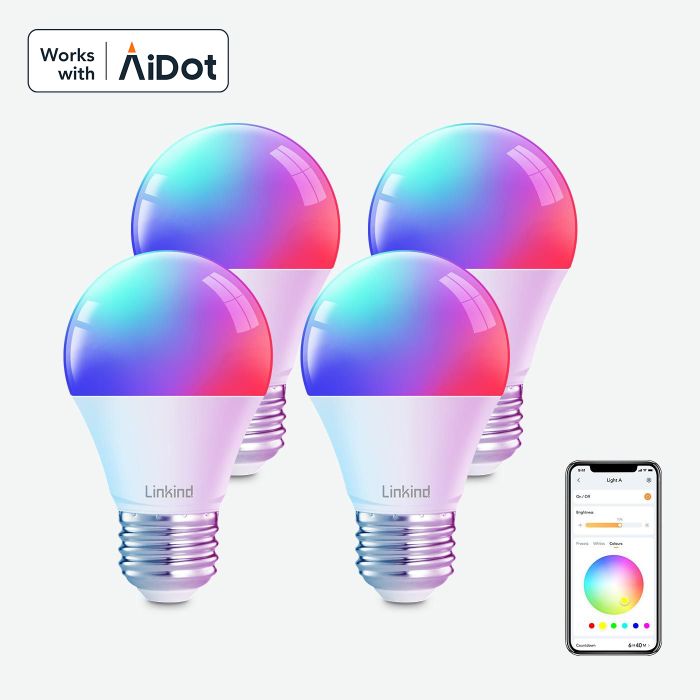
-
Work with Alexa: Control these smart LED light bulbs with your voice through Google Assistant or Alexa, or use the AiDot app to adjust on/off, brightness, color temperature, and schedules from anywhere, and enjoy the convenience and flexibility of smart lighting technology.
-
Voice Control: enable easy voice-controlled on/off, color-changing, and dimming/brightening of your home lighting, compatible with Alexa and Google Assistant, and require no hub with all functions accessible via a 2.4Ghz WiFi connection.
-
Preset Scenes & Time Schedule: Schedule auto-on/off for your Linkind smart bulbs on the app and choose preset festival scenes to decorate your home for an authentic expression.
-
Color Changing: Enjoy 16 million colors and a 2700K to 6500K range with our smart bulbs, perfect for adding vibrant hues to your life and serving as daily lighting for an authentic expression.
-
Group Control & High Quality: Provides reliable and convenient smart lighting solutions with 20 years of experience in the industry, allowing you to control multiple bulbs from anywhere with a stable 2.4GHz Wi-Fi connection.
Final Thoughts
The choice between Bluetooth and WiFi light bulbs ultimately depends on your specific needs and preferences. Bluetooth Smart Light bulbs offer simplicity and ease of use, making them ideal for smaller spaces and straightforward setups. On the other hand, WiFi Smart Light bulbs provide broader control range and advanced integration with other smart devices, making them perfect for larger homes and comprehensive smart home setups.
Regardless of your choice, smart light bulbs offer unparalleled convenience, energy efficiency, and control over your smart home lighting. They transform everyday living by creating a personalized and interconnected living environment that responds intuitively to your needs.
As you embark on your journey to upgrade your home with smart lighting technology, consider the insights provided in this article to make an informed decision tailored to your lifestyle. Whether you opt for Bluetooth or WiFi bulbs, the future of lighting technology is bright, and Linkind is here to illuminate your smart home experience.
FAQs about Smart Light Bulbs
Q1: Are WiFi or Bluetooth lights better?
It depends on your needs. WiFi lights offer more features and remote access, while Bluetooth lights are simpler and more energy-efficient.
Q2: Is Bluetooth faster than WiFi?
Bluetooth connections are generally faster for close-range communication but are limited in range compared to WiFi.
Q3: What is the difference between WiFi and Bluetooth connection?
WiFi offers a longer range and internet connectivity, while Bluetooth is short-range and connects directly to devices without the need for internet.
Q4: Do Bluetooth lights use energy when off?
Bluetooth lights consume a minimal amount of energy when off to maintain the connection, but it's generally negligible.












